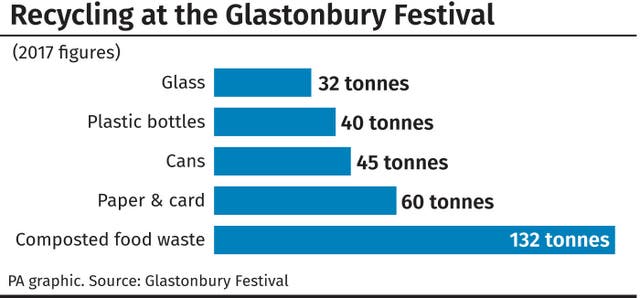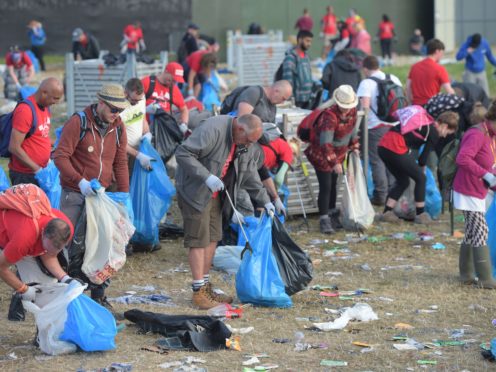Emily Eavis hopes measures at Glastonbury Festival such as banning single-use plastic bottles and encouraging the use of public transport will inspire fans to live more sustainably.
The co-organiser of the event, headlined by The Cure, The Killers and Stormzy this year, urged those attending to bring tents that could be reused for “a lifetime” instead of being dumped at the Somerset site.
Festival-goers are asked to use public transport to travel to Worthy Farm and to unplug any non-essential appliances at their homes before setting off.
Today is #NationalRefillDay – the perfect opportunity to remind you that single-use plastic drinks bottles are banned at @GlastoFest this year!
We're on hand with 37 WaterAid kiosks around the festival site to keep you topped up and hydrated, see you there! #Glastonbury2019 pic.twitter.com/mfjQxQaZK4
— WaterAid UK 💦 (@WaterAidUK) June 19, 2019
They are discouraged from using disposable wipes, even those labelled biodegradable, and to bring reusable water bottles they can re-fill for free at taps and WaterAid kiosks.
There are only a small number of showers available to preserve water, with festival organisers suggesting visitors take a wash cloth and bar of soap for strip-washes instead.
“Sustainability and the need to live in harmony with the land, has always been vital to Glastonbury Festival,” Eavis said.
“Our festival sits on farmland; it’s home to a rich natural habitat and it is our duty to look after that year round.
“We know from our work with our partners at Oxfam, Greenpeace and WaterAid that the impact of climate change is putting vast amounts of pressure on our natural world and on many communities world-wide.
Coming to this year's Festival? Please remember to… pic.twitter.com/KjA6fAexb5
— Glastonbury Festival (@GlastoFest) May 25, 2019
“Now is our last chance to make important changes to the way we live.
“If we can help our Festival-goers to be more aware of their lifestyles and inspire them to live their lives more sustainably, we might turn these small ripples of action into huge waves of change.”
The festival, which announced the plastic bottle ban in February, has the philosophy “Love the Farm, leave no trace”.
Non-compostable plates, cups, straws, sauce sachets and cutlery have already been stopped at Glastonbury.
A staggering 132 tonnes of food waste was composted following the 2017 event, while 4,500 litres of cooking oil was turned into biofuel.

Around 1,300 recycling volunteers ensure that litter is hand-separated before being processed at the festival’s on-site recycling facility.
More than 60 tonnes of paper and card, 32 tonnes of glass, 40 tonnes of plastic bottles and 45 tonnes of cans were recycled in 2017.
Eavis said: “We’re always thinking about how we can make Glastonbury more sustainable but the most dramatic change for this year is that we have banned the sale of single-use plastic drinks bottles on the festival site.
“In the last few years we’ve all begun to see how simply recycling plastic is not really a solution.

“The best way to avoid plastic pollution and the wasting of resources that go into making it, is simply to reduce plastic use.
“With more than one million plastic bottles sold at Glastonbury 2017, we felt that stopping their sale is the only way forward.”
Single-use plastic drinks bottles will also no longer be available in any of the backstage, production, catering and dressing room areas.
And from this year, all the bin bags used to collect recycling and waste will be made of recycled plastic.
These will be recycled again to make more bin bags.
Coming to this year's Festival? Please remember to… pic.twitter.com/KjA6fAexb5 — Glastonbury Festival (@GlastoFest) May 25, 2019
She urged festival-goers to avoid leaving their tents at the festival, as they often cannot be reused or recycled.
“It’s awful to imagine any tent could be branded as single-use, especially as so many precious resources are used to make it,” she said.
“We would love everyone to come to the festival with a sturdy, fit-for-purpose tent that they will take home with them again and reuse ov
Coming to this year's Festival? Please remember to… pic.twitter.com/KjA6fAexb5
— Glastonbury Festival (@GlastoFest) May 25, 2019
“Now is our last chance to make important changes to the way we live.
“If we can help our Festival-goers to be more aware of their lifestyles and inspire them to live their lives more sustainably, we might turn these small ripples of action into huge waves of change.”
The festival, which announced the plastic bottle ban in February, has the philosophy “Love the Farm, leave no trace”.
Non-compostable plates, cups, straws, sauce sachets and cutlery have already been stopped at Glastonbury.
A staggering 132 tonnes of food waste was composted following the 2017 event, while 4,500 litres of cooking oil was turned into biofuel.

And more than 500 tonnes of horticultural compost is created each year from the 1,200 compost toilets.
Around 1,300 recycling volunteers ensure that litter is hand-separated before being processed at the festival’s on-site recycling facility.
More than 60 tonnes of paper and card, 32 tonnes of glass, 40 tonnes of plastic bottles and 45 tonnes of cans were recycled in 2017.
Eavis said: “We’re always thinking about how we can make Glastonbury more sustainable but the most dramatic change for this year is that we have banned the sale of single-use plastic drinks bottles on the festival site.
“In the last few years we’ve all begun to see how simply recycling plastic is not really a solution.

“Single-use plastic is a huge threat to our planet. It pollutes our environment and its unnecessary manufacture consumes too many of our natural resources and contributes massively to climate change.
“The best way to avoid plastic pollution and the wasting of resources that go into making it, is simply to reduce plastic use.
“With more than one million plastic bottles sold at Glastonbury 2017, we felt that stopping their sale is the only way forward.”
Single-use plastic drinks bottles will also no longer be available in any of the backstage, production, catering and dressing room areas.
And from this year, all the bin bags used to collect recycling and waste will be made of recycled plastic.
These will be recycled again to make more bin bags.
Coming to this year's Festival? Please remember to… pic.twitter.com/KjA6fAexb5 — Glastonbury Festival (@GlastoFest) May 25, 2019
She urged festival-goers to avoid leaving their tents at the festival, as they often cannot be reused or recycled.
“It’s awful to imagine any tent could be branded as single-use, especially as so many precious resources are used to make it,” she said.
“We would love everyone to come to the festival with a sturdy, fit-for-purpose tent that they will take home with them again and reuse over a lifetime of camping experiences.”
